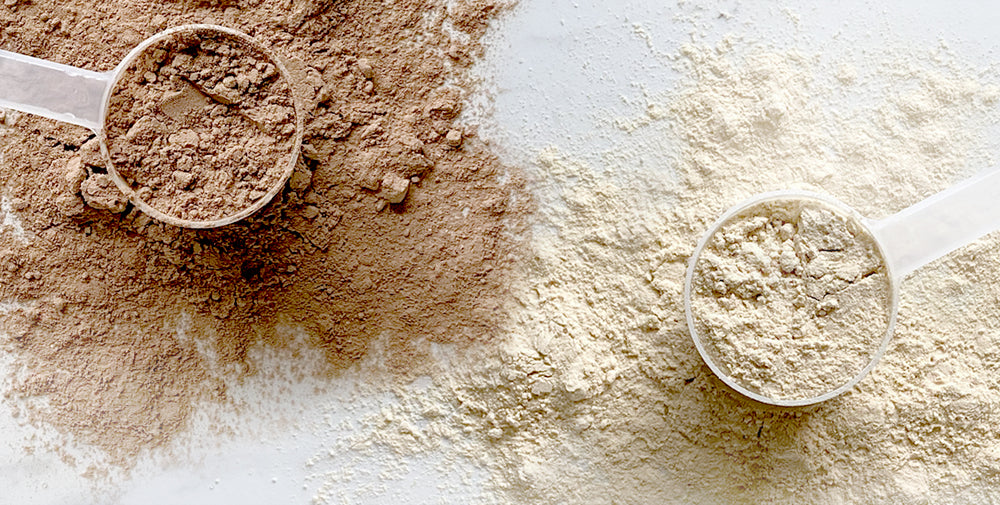Whether you’re lactose intolerant, sensitive to whey, or you don’t eat animal products for ethical or health reasons, there are plenty of reasons why you may be questioning if you can get the same muscle-building benefits from a plant-based protein powder.
So, let’s take a closer look at the important role that protein plays, what types of whey and plant proteins are best for your healthy lifestyle, and how they compare when it comes to quality and muscle-building benefits.
Why Is Protein Important?
Protein is an important macronutrient that is essential for muscle growth and repair, the production of hormones, enzymes, immune function, and even bone health. Protein is made up of more than 20 building-block amino acids—9 of which are considered essential because the body can’t make them, which means we need to get them from food.
When we eat protein, a metabolic process called muscle protein synthesis (MPS) occurs. Our bodies break down the amino acids in protein and they are used to support muscle growth and repair muscles.
Here’s the thing though, not all amino acids in protein are created equal and some are more important to MPS than others. The primary amino acid responsible for MPS is actually a branch-chain amino acid (BCAA) called leucine. Leucine is a prominent amino acid in whey protein powder, but can be a little trickier to get adequate amounts of in plant-based protein powders. This is why it’s important to know what to look for in a plant-based product.
Of course, you know that you can get protein from food sources such as fish, chicken, beef, tofu, lentils, beans, and more. But if you eat a plant-based diet, getting enough of the right protein, especially if building muscle is a goal, can be tricky. This is where protein powders—specifically the right protein powders—make all the difference.
The Difference Between Plant Protein And Whey Protein
Let’s start with some basics. First, let’s look at what both protein sources are. Whey is derived from cow’s milk as a byproduct of the cheese-making process. Whey is actually the watery part of dairy milk that is used to make cheese. But for the purposes of making whey, it is instead processed and dried into a powder form. It comes in an isolate and concentrate form but isolate is the more processed and purest form of the two.
Whey protein isolate has long been considered the holy grail for protein powders because it’s a rich source of complete protein that contains all 9 essential amino acids, which are required for MPS and therefore muscle growth.
Plant-based proteins come from a variety of sources. They can be made from brown rice, peas, soy, hemp, chia, flax, sacha inchi, pumpkin seed, and sunflower seed. Because most plant-based protein powders do not contain all 9 amino acids, manufacturers will often combine more than one plant source in order to achieve a complete amino acid profile in a formulation. A good example of this is a rice and pea blend.
When you opt for a high-quality plant-based protein powder that is a blend of more than one protein source—called complementary proteins—you can achieve a relatively good MPS stimulation, but that’s only possible with the combination of plant proteins with the essential amino acids needed for MPS. Those amino acids are methionine, lysine, and leucine.
So far, the plant sources of protein powder that achieve a near complete amino acid profile that contain those three amino acids are soy protein or a blend of brown rice and pea protein.
Can Plant Protein Support Muscle Growth Like Whey?
So now that you know you can achieve good MPS results with plant-based proteins, let’s take a look at how plant protein and whey compare for adding muscle mass.
Now, don’t forget, in addition to consuming enough high-quality protein, you need to engage in regular resistance training in order to develop muscle mass. But a number of studies have shown that plant protein powers with the right amino acid profile—especially BCAA leucine—and getting enough of it—can be effective for developing strength and adding muscle mass.
Experts recommend consuming 0.6 to 0.9 grams of protein per pound of body weight. Be sure to look for a protein powder that contains at least 20 grams of high-quality protein per scoop, such as Purely Inspired’s Organic Protein, a blend of organic pea and brown rice proteins.
Bottom Line
With enough high-quality plant protein, you can build a good amount of lean muscle. This is great news for anyone on a plant-forward diet. Try to get a portion of your plant-based protein from protein powders, which have a more complete amino acid profile than a single food source and are more easily digested and absorbed so they can go to work making muscle.
If you can, sample a few protein powders before you commit to one in order to rule out ingredient sensitivities. In both whey and plant-based products, sensitivities have been known to occur. Keep a food diary to track any observations until you find the perfect protein powder for you.
Whey vs. Plant-Based Protein At A Glance
| Plant-based protein powder | Whey protein powder | |
| Builds strength and muscle | ✔ | ✔ |
| Is a complete protein (9 essential amino acids) | Only certain blends like rice and pea or soy | ✔ |
| Is dairy (lactose) free | ✔ | ❌ |
| Vegetarian and vegan friendly | ✔ | ❌ |
| Contains 20-30 grams of protein per scoop | Sometimes, be sure to check the label | ✔ |
*The links used in this article are being provided as a convenience and for informational purposes only; they do not constitute an endorsement or an approval by Iovate Health Sciences International Inc. or any of its affiliates (“Iovate”) of any of the products, services or opinions of the corporation or organization or individual. Iovate bears no responsibility for the accuracy, legality or content of the external site or for that of subsequent links. Contact the external site for answers to questions regarding its content.



